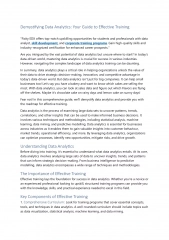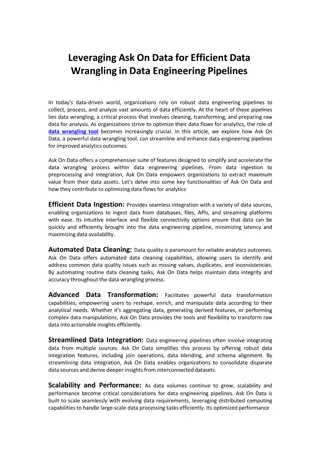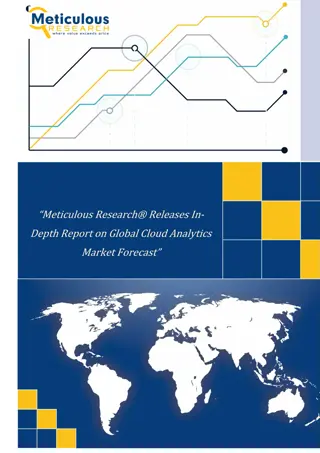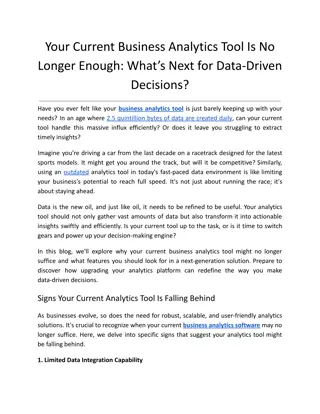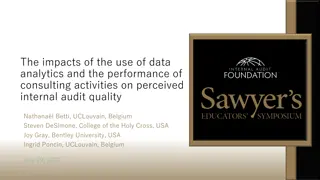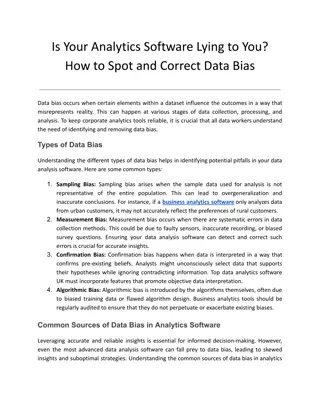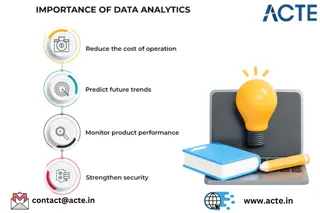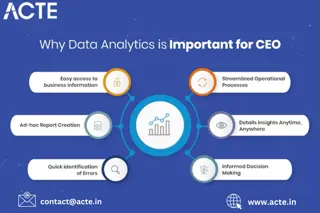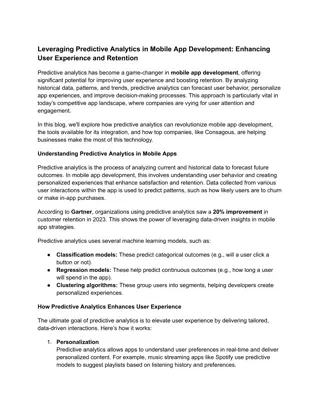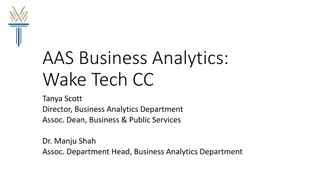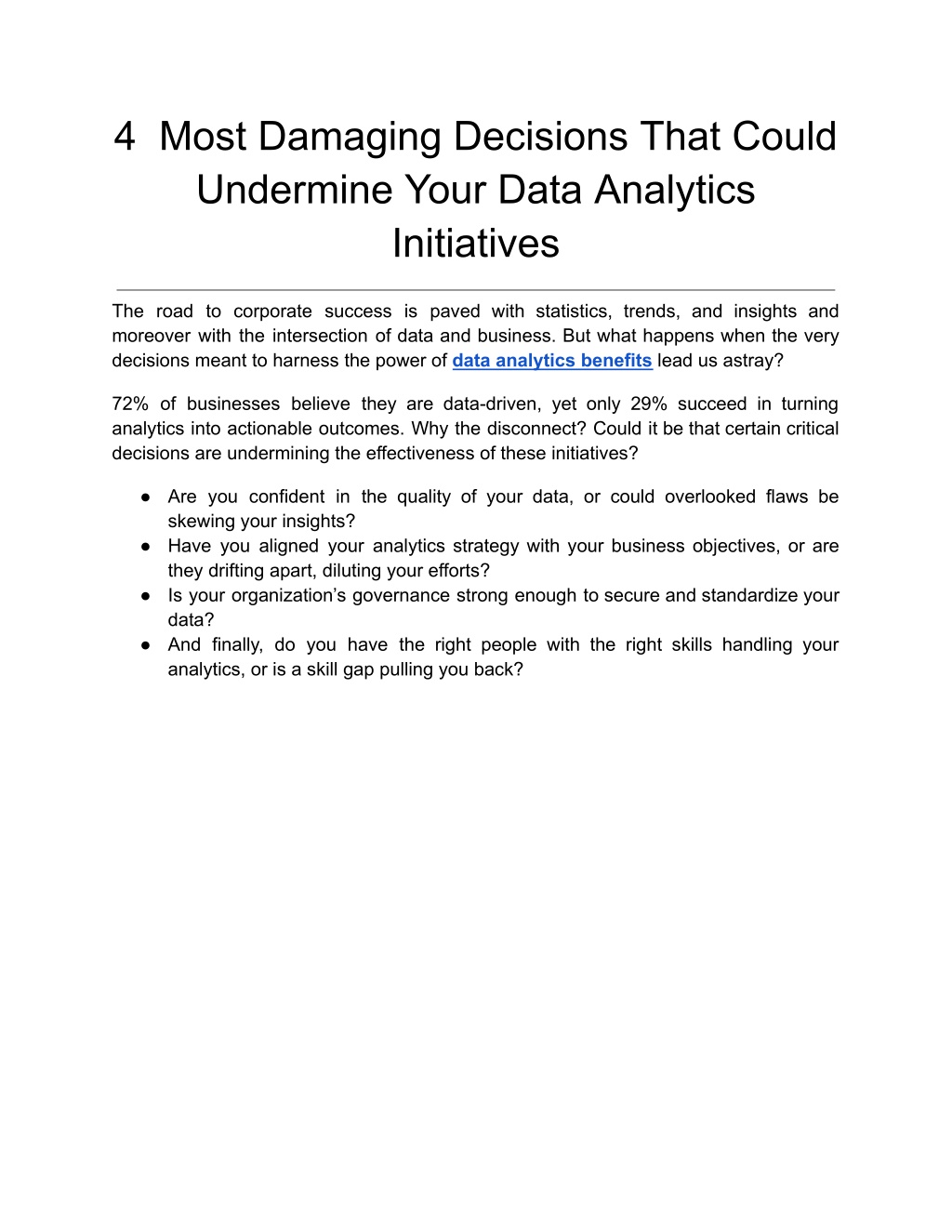
4 Most Damaging Decisions That Could Undermine Your Data Analytics Initiatives
Delve into the four critical misjudgments that could disrupt your data analytics ventures, from overlooking data integrity to undervaluing expert analysts. Learn how to pinpoint these prevalent oversights and recalibrate your tactics for optimized, i
Download Presentation

Please find below an Image/Link to download the presentation.
The content on the website is provided AS IS for your information and personal use only. It may not be sold, licensed, or shared on other websites without obtaining consent from the author. Download presentation by click this link. If you encounter any issues during the download, it is possible that the publisher has removed the file from their server.
E N D
Presentation Transcript
4 Most Damaging Decisions That Could Undermine Your Data Analytics Initiatives The road to corporate success is paved with statistics, trends, and insights and moreover with the intersection of data and business. But what happens when the very decisions meant to harness the power of data analytics benefits lead us astray? 72% of businesses believe they are data-driven, yet only 29% succeed in turning analytics into actionable outcomes. Why the disconnect? Could it be that certain critical decisions are undermining the effectiveness of these initiatives? Are you confident in the quality of your data, or could overlooked flaws be skewing your insights? Have you aligned your analytics strategy with your business objectives, or are they drifting apart, diluting your efforts? Is your organization s governance strong enough to secure and standardize your data? And finally, do you have the right people with the right skills handling your analytics, or is a skill gap pulling you back?
Join us as we delve deep into the four most damaging decisions you might be making in your data analytics initiatives missteps that not only jeopardize the integrity of your data but also your strategic objectives and, ultimately, your competitive edge. Let s explore how to identify these pitfalls and steer clear, ensuring your data and information in business processes work for you and not against you. Four Critical Mistakes Sabotaging Your Data Analytics 1. Overlooking Data Quality and Integrity Data quality issues often masquerade as minor nuisances but can escalate into catastrophic errors that misguide critical business decisions. When data is corrupted, incomplete, or inconsistent, it injects a dose of uncertainty into every analysis. This uncertainty can manifest in various detrimental ways: 1. Strategic Misdirection: For businesses, strategic decisions pivot on the axis of data-driven insights. When the foundation of these insights data quality is compromised, the entire strategy can veer off course. A data analytics tool is
only as good as the data it processes; flawed inputs inevitably lead to flawed outputs, thus misleading strategic directions. 2. Resource presupposes a return on investment through sharper insights and more informed decision-making. However, when these tools are fed poor-quality data, the expected data analytics benefits remain unrealized, turning potential efficiency gains into sunk costs. Instead of catalyzing efficiency, it leads to draining budgets without yielding advantages. 3. Operational Disruptions: In the operational realm, data informs everything from supply chain logistics to customer relationship management. Poor data quality can lead to misinformed assessments of inventory needs, misguided customer outreach efforts, and flawed predictions of market trends. Each of these missteps can disrupt operations, tarnish customer relationships, and erode competitive edges. Drainage: Investing in high-powered data analytics tools
The implications of poor data quality extend beyond isolated analytic errors. They permeate the broader spectrum of business processes, causing systemic inefficiencies and eroding trust in data-driven methodologies: Erosion inaccuracies in data reports, their confidence in data-driven processes wanes. This skepticism can undermine data culture, making it difficult to harness the collective power of data analytics across the organization. Compliance and Reputation Risks: Regulatory frameworks often require stringent data management practices. Ignoring data quality can expose the business to legal penalties and reputational damage if inaccurate data leads to compliance failures. Customer Dissatisfaction: In the age of personalized services, customers expect businesses to understand their needs and preferences accurately. Data inaccuracies can lead to misguided personalizations, resulting in customer dissatisfaction and eventual churn. of Employee Confidence: When employees witness recurrent In short, data quality directly influences the effectiveness of data and business strategies, making it essential for accurate analytics. 2. Failing to Align Analytics with Business Objectives When data analytics initiatives diverge from the strategic objectives of a business, the result can be as detrimental as navigating a ship without a compass in stormy seas. Misalignment between the analytics efforts and business goals doesn t just dilute the impact of analytics; it can actively steer business decisions in the wrong direction, wasting resources and opportunities. Let s delve into why aligning your data analytics tool with business objectives is crucial and how failing to do so can severely undercut your data-driven initiatives. Data analytics serve as the navigational tools of the modern business vessel. They inform decisions, predict trends, and offer insights that can propel a business forward. However, if these tools are not calibrated to align with the overarching goals of the business, the journey can lead to uncharted and often treacherous waters. 1. Resource Misallocation: Data analytics tools are potent, capable of processing vast amounts of data and information in business processes. Yet, if these tools aren t tuned to support the specific strategic goals of an enterprise, they can inadvertently become resource hogs. This misallocation can manifest in various ways excessive spending on irrelevant data collection, wasted man-hours in analyzing non-impactful data, and lost opportunities due to overlooking key strategic data points.
2. Opportunity Cost: Every hour spent crunching numbers that dont directly contribute to strategic goals is an hour not spent on potentially valuable insights that align with core objectives. The cost isn t just measured in time or money but in missed opportunities. When analytics do not focus on relevant business goals, companies may miss out on crucial market movements, competitor actions, and internal improvements. 3. Strategic Drift: Perhaps the most insidious effect of misalignment is strategic drift. This occurs when the insights produced by data analytics gradually start pulling the business away from its intended strategic path. Over time, this can result in a significant shift in the business s focus, diluting brand identity and confusing stakeholders, from the boardroom to the marketplace. 3. Neglecting the Importance of Data Governance Data governance involves overseeing the availability, usability, consistency, data integrity, and security of the data employed in an enterprise. A lack of robust data governance can lead to several deeply ingrained issues within the data analytics processes, which can ripple across the entire organization. 1. Data Security Vulnerabilities: Without stringent governance protocols, data is susceptible to security breaches and unauthorized access. Each incident of data compromise can result in significant financial losses, erode customer trust, and attract regulatory penalties, especially in sectors where data protection laws are strict. 2. Quality Compromise: Governance is not just about securing data from external threats but also about maintaining its quality throughout its lifecycle. Poor governance means analytics tools may rely on compromised, outdated, or incomplete data, leading to skewed analytics that could mislead rather than guide business strategies. 3. Regulatory Non-Compliance: Many industries are subject to regulations regarding data handling and processing. Neglecting data governance can result in non-compliance, leading to legal issues and fines. This aspect is crucial in maintaining the integrity of data and business processes, ensuring that all operations are aligned with legal standards. The Domino Effect of Poor Data Governance The implications of weak data governance extend beyond immediate security risks and touch every facet of an organization s operations: Operational Inefficiency: In the absence of good governance, data becomes siloed and inconsistent. This lack of coordination can lead to operational
inefficiencies, where teams across the same organization are unable to collaborate effectively because they do not have access to the same, reliable data. Decision-Making Paralysis: Data-driven decisions require high-quality data that governance frameworks ensure. Without themselves unable to trust the insights derived from their own data analytics tools, leading to decision-making paralysis. Brand Damage: Repeated instances where data mismanagement becomes apparent can hurt a company s brand reputation. Trust, once lost, is hard to regain, especially if customers feel their data is not treated with the respect and care it demands. it, decision-makers might find Strong data governance ensures that the framework of data and business operations remains secure and efficient, safeguarding inconsistencies. against potential threats and 4. Underestimating the Need for Skilled Personnel The sophistication of your tools is only as effective as the proficiency of the individuals wielding them. Skilled personnel are the linchpins in the machinery of data-driven decision-making; their insight, experience, and creativity turn raw data into strategic gold. Underestimating the need for such skilled personnel can be a critical oversight, one that potentially derails the entire analytics operation, causing far-reaching repercussions within the organization. The Crucial Role of Expertise in Data Analytics Skilled personnel bring more than just technical know-how to the table; they possess a nuanced understanding of how to blend data with business processes, ensuring that insights are not only relevant but also actionable. Without this expertise, even the most advanced data analytics tools can yield results that are either misleading or underutilized, thereby squandering the data analytics benefits that businesses seek. 1. Misinterpreted Data: Data requires interpretation, and without the correct expertise, the chances of misreading data patterns increase. Skilled analysts know how to differentiate between correlation and causation, a common pitfall in data interpretation. Misinterpretations can lead businesses down costly and ineffective paths. 2. Underutilized Tools and Technologies: Advanced data analytics tools are potent assets in an organization s arsenal, designed to extract complex patterns and insights. However, without the requisite skill set, these tools can remain
grossly underutilized, turning potential game-changers into mere overhead expenses. 3. Innovation Stagnation: Skilled personnel are not just executors; they are also innovators. They can identify new areas where data can be leveraged, propose innovative solutions, and keep the company at the cutting edge of analytics trends. A lack of such talent can leave a business trailing its competitors. The Impact of Skill Shortages on Business Operations The absence of adequately skilled data analysts can create a domino effect throughout the business, impacting everything from strategic planning to operational efficiency: Strategic Blindspots: Without skilled data analysts, businesses may miss out on insights that could inform critical strategic moves. This oversight can manifest as blind spots in understanding market conditions, consumer behavior, or emerging trends. Operational Inefficiencies: Skilled analysts optimize data workflows and streamline data and information in business processes. Their absence can lead to inefficiencies, with teams spending management rather than using information to drive decisions. Risk of Data Breaches: Skilled data personnel are also adept at recognizing and mitigating data security risks. A deficiency in this area not only affects analytics but also increases the vulnerability of the business to data breaches. more time grappling with data Skilled personnel are essential not just for operating advanced data analytics tools but for ensuring that the data analytics benefits fully permeate the organization, enhancing decision-making across all levels. Conclusion While wading through the intricate landscape of data analytics, the choices we make can significantly influence the trajectory of our business strategies. The four pitfalls discussed neglecting data quality, misaligning analytics with business objectives, underestimating the importance of data governance, and overlooking the need for skilled personnel are not just errors; they are strategic missteps that can derail our data-driven initiatives. Each decision can create ripples, distorting the clarity of insights and compromising the integrity of our analytics outcomes. To move forward, it is imperative that organizations not only recognize these potential setbacks but proactively implement measures to avoid them. It s about forging a path that aligns closely with our strategic goals, nurtures our data environment, and
leverages the full potential of our analytical tools and teams. In this endeavor, choosing the right data analytics platform can make a decisive difference. Grow offers a robust analytics solution that is designed to empower businesses to harness the full spectrum of their data s potential. With features that emphasize ease of use, comprehensive data integration, and powerful analytics capabilities, Grow helps ensure that your data works for you not against you. By optimizing data processes and enhancing decision-making, Grow equips businesses with the tools necessary to sidestep these common pitfalls effectively. Interested in seeing how Grow can transform your data analytics strategy? Take advantage of the 14-day free trial to experience firsthand how Grow can streamline your data and information in business processes and bolster your decision-making capabilities. Additionally, to better understand how Grow stands up against other platforms and to explore the specific benefits it can offer your business, visit "Grow Reviews Cost & Features on GetApp". Empower your business with the right tools and strategies, and watch your data transform from mere numbers into actionable, strategic assets. With Grow, your journey towards more effective data analytics is just a few clicks away. Start your trial today and begin reshaping your data-driven decision-making for the better. Original Source: https://bit.ly/3T5iMY8



